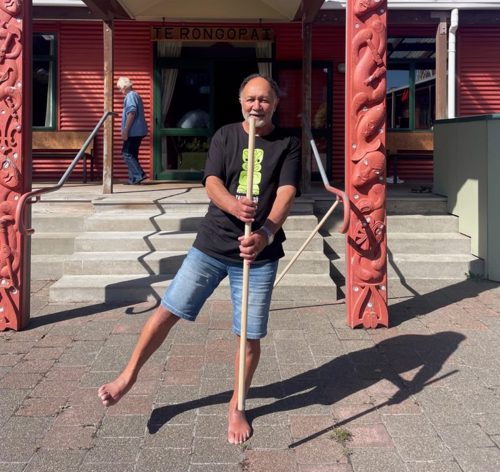Once a week in Invercargill, elders gather together to gently exercise using poi, rākau and movement.
 Taurite Tū regular, Phil Ngeru, uses rākau for one of the programme's exercises at Te Tomairangi Marae. Photo: Ngā Kete Mātauranga Pounamu Charitable Trust
Taurite Tū regular, Phil Ngeru, uses rākau for one of the programme's exercises at Te Tomairangi Marae. Photo: Ngā Kete Mātauranga Pounamu Charitable Trust
They’re at the beautiful Tomairangi Marae, adding their stories to its story.
Each participant goes at his or her own pace, improving balance and strength which may be weakening after sixty, seventy or eighty years.
They stand or sit and can take time to reflect.
The cheerful facilitators give instructions in Te Reo Māori and are specially trained in this marae based strength and balance programme.
“I enjoy it because it’s not too strenuous but exercises every part of your body,” says regular participant Terry King (81).
After their hour-long Wednesday morning class, the kaumātua, or elders, often share a healthy meal together: eating, talking, listening, laughing.
They enjoy a sing-song to the strum of ukuleles and a guest might discuss an interesting topic or the nurses lead a health clinic.
This is all part of Taurite Tū, or Stand Strong, which has been running in Invercargill for a couple of years, with noticeable results.
Ngā Kete Mātauranga Pounamu Charitable Trust CEO, Tracey Wright-Tawha, says the programme was put together by Katrina Pōtiki Bryant, from the University of Otago School of Physiotherapy.
“It’s a nice programme with a simple heart,” Tracey says.
The trust runs Taurite Tū in Invercargill. Regular participants report that their physical health has improved. Some can walk to the letterbox or go swimming or walking again.
Others like being with those their own age and working at their own pace.
“Other people love it because it’s Māori in content,” Tracey says.
This relates to all things being in balance, to physical well-being and to whānau, or family, connections and ties.
The exercises employ traditional performance moves using poi and rākau, or sticks.
“There’s as many reasons as the day’s long about why people do it – primarily, it’s that they’re together.”

Lessening the risk of falls
According to the Health Research Council website, falls are a leading cause of injury for ageing Māori and this can have major impacts.
The council says Taurite Tū has demonstrated “statistically significant improvement” in lessening the risk of falls. It has also succeeded in being something Māori people want to do.
Tracey notes that as people age, they may feel more alone because of being widowed or friends passing away.
Elders might struggle with a lack of mobility and increased isolation may cause some to feel depressed.
The healthy meal and social aspect are part of the life of Taurite Tū.
We call it whanaungatanga – they’d probably call it having a bit of fun.”
“It’s a great programme, recognising that we’re stronger together and you can do something about your health and well-being.”
She says the kaumātua group includes about 50 and about 24 regularly attend the weekly exercise class.
Katrina trained the Taurite Tū facilitators and Tracey describes her as an amazing lady.
In Dunedin, Katrina is an active member of Te Rūnanga o Ōtākou, which designed the programme, together with physiotherapists and Māori movement experts.
Katrina says Taurite Tū is also being delivered in Awarua/Bluff, Hokonui/Gore, Waitaki/Oamaru, Gisborne and Porirua.
Invercargill regular Terry enjoys the risk-free environment, the friendly, supportive older folk and his class leader and instructor.
“Nadine Young provides clear direction in a warm and friendly manner with empathy and patience for all participants,” he says.
Terry has had spinal surgery, resulting in balance issues. The octogenarian says the exercises strengthen body muscles from head to toe.
“The programme has an emphasis on legs, addresses incontinence, and has eye exercises to relax and strengthen eye muscles,” he explains.
Tracey sums up the feeling of Taurite Tū as she reflects on the elders who participate.
“We love them dearly and one day we’ll be in their footsteps.”
This story was published on the Daily Encourager.